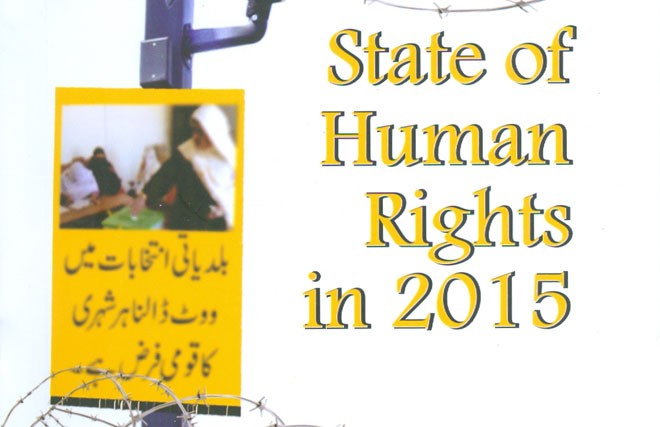
A comprehensive account of human rights situation during the whole of last year

The Human Rights Commission of Pakistan (HRCP) started raising the flag of human rights in Pakistan in the mid-1980s when there was little awareness of these issues among the general public. The credit goes to the HRCP for making human rights apart of national discourse. Even those sections of the society and political groups who viewed the HRCP’s efforts with suspicion at one time later sought its umbrella when they were on the receiving end.
Towards the end of the first quarter of each year, the HRCP publishes a compendium describing the state of human rights in the country in the previous year under 18 different subjects. The report is awaited by scholars, journalists and activists for it provides a comprehensive account of human rights situation during the whole year.
The HRCP’s annual report not only gives a comprehensive overview of the human rights violations in the given year but it is also a kind of annual almanac with immense value. If we put together all the annual reports of the HRCP during the last more than 20 years, they make up a history of Pakistan. The 2015 annual report keeps up the tradition with some welcome changes in its layout that makes it quite lively.
This is perhaps the only publication in the country that so consistently keeps track of all the legislative and administrative measures taken in all spheres of public life during the year under review. The 2015 report summarises the actions taken by the federal and four provincial governments and research reports of various thinktanks on the state of fundamental freedoms, democratic development, rights of the disadvantaged such as women, children, labour’s economic and social rights.
A set of recommendations follow a detailed account of each subject, which if our rulers give attention to can make a huge difference in the governance. For example, the chapter on laws and law-making calls upon the legislature to introduce effective ways to inform the people in time about every bill that is drafted, so that the lawmakers are able to gather public opinion and make informed decisions.
The HRCP also urges the parliament to actively solicit the opinions of experts before adopting laws where appropriate expertise is needed to guide the lawmakers on how they should vote. It advises the government to facilitate all lawmakers, from both the treasury and opposition benches to consider the pros and cons of every bill and to discuss it in detail before putting them to vote.
The report provides a valuable insight into the working of the judiciary. It says: "Dispensation of justice remained protracted, with 2,700 cases pending before the Supreme Court and 60,000 each in the Lahore and Sindh High Courts, and 9,000 in the Balochistan High Court and 28,487 in the Peshawar High Court. The Commission recommends that the judiciary should devise ways and means to minimise pendency of cases.
The Commission also calls upon the judiciary to do serious work to erase the impression of corruption within its ranks. "This also includes ensuring that lawyers are also doing their jobs with integrity and the bar councils are safeguarding the legal community from corrupt practices and general misconduct."
The HRCP’s distinction is that it touches upon subjects such as the state of our jails and investigation agencies and some obscure aspects of political participation which hardly find mention in the media or legislative assemblies. For example, we come to know that the gap between the number of male and female voters increased roughly by 68,000 over the past two and half years. More than 11.5 million eligible voters remain unregistered, according to the Commission.
Taking a broad view of the law and order situation and enforcement of law, the Commission recommends that besides construction of new jails to address the problem of overcrowding, the judicial system should devise alternatives to penal servitude and incarceration of under-trial prisoners for long period of time.
The Commission draws our attention to the fact that it has been three years since Pakistan ratified the Convention Against Torture but it has not been codified into law. It asks the government to proceed on this matter with greater urgency and also build advanced forensic institutions in order to reduce chances of custodial torture to extract confession.
Needless to say the overall picture of the state of human rights in Pakistan that emerges from this report is quite depressing, especially given the facts that poverty is pervasive and the state’s expenditures on education and health sectors are quite low. The country is faced with some grave challenges like militancy, climate changes, a huge number of refugees and internally displaced people. HRCP’s research and commentary on all these pressing issues provides a solid intellectual input to political parties and activists to chalk out a national agenda and plan of action for moving forward.
Highlights and main points of the HRCP findings are given in the beginning, but the report can be made more valuable and user-friendly if an index is inserted as well. This will be helpful in searching certain event or topic in the voluminous book. The mention of sources of data and references, which are missing in certain cases, can further lend authenticity to the report. The HRCP also needs to consider including a separate chapter on the issue of corruption in its report as widespread corruption, in many ways, has become an issue of human rights in this country.